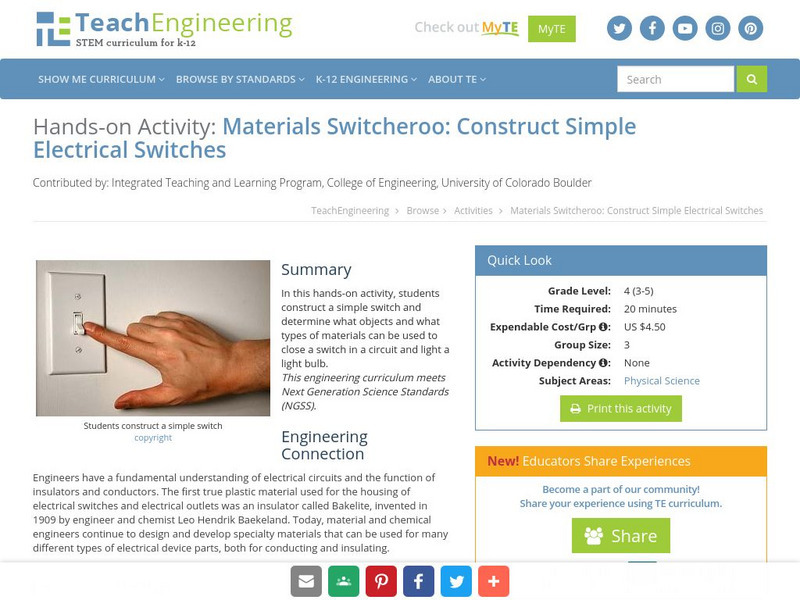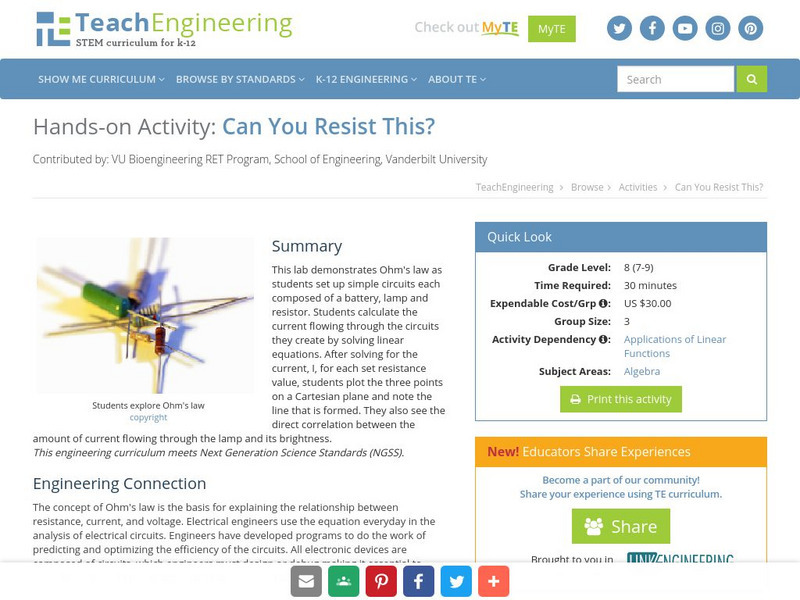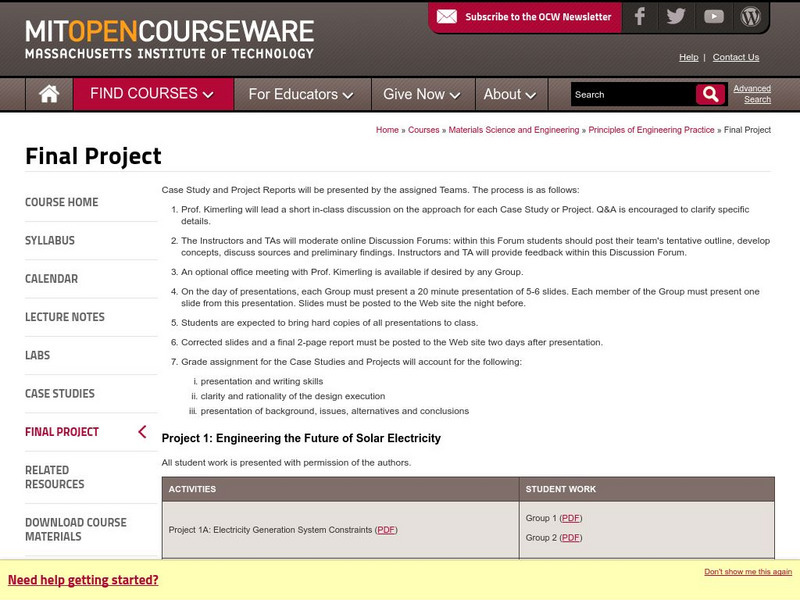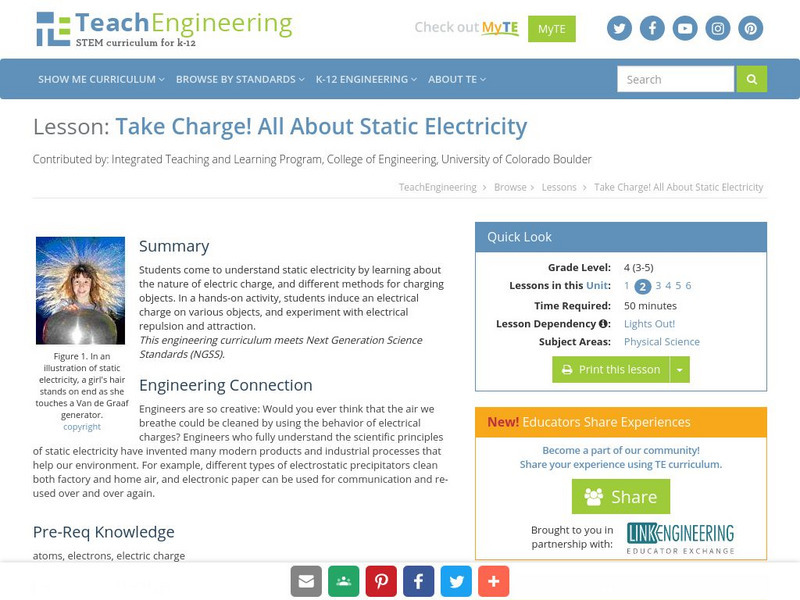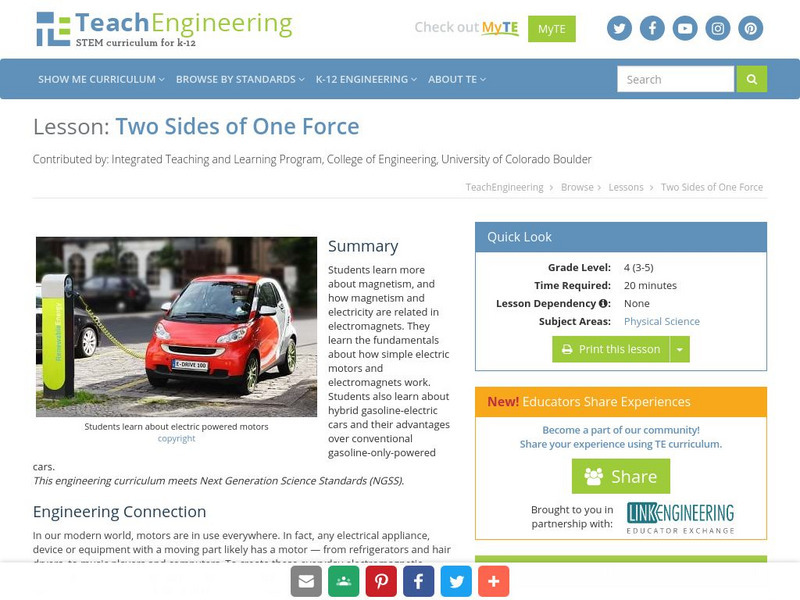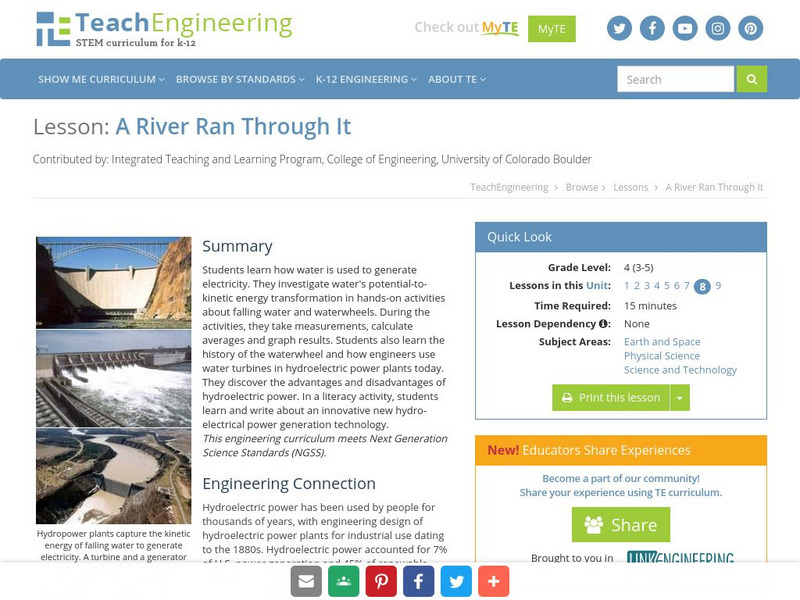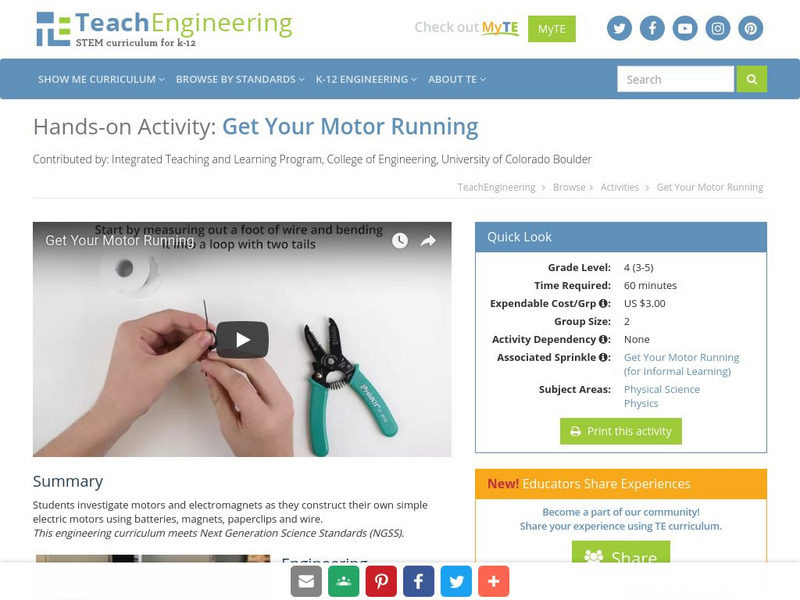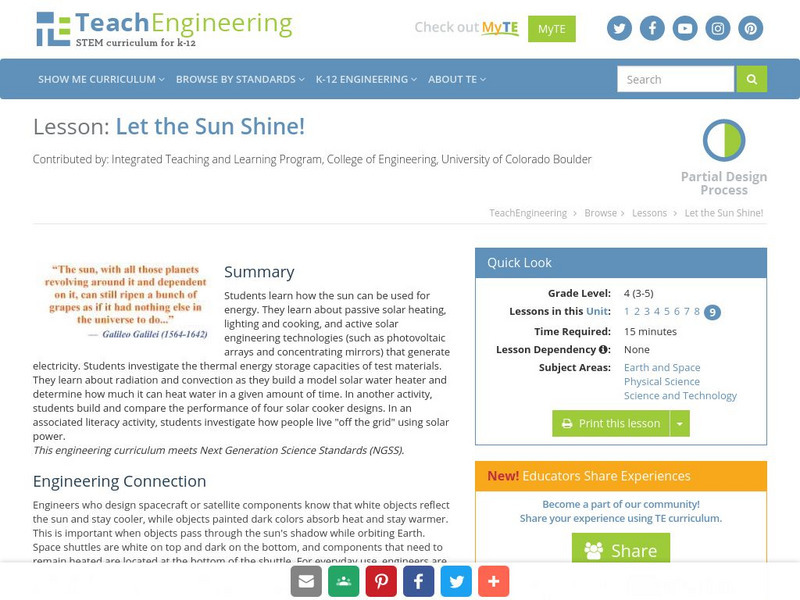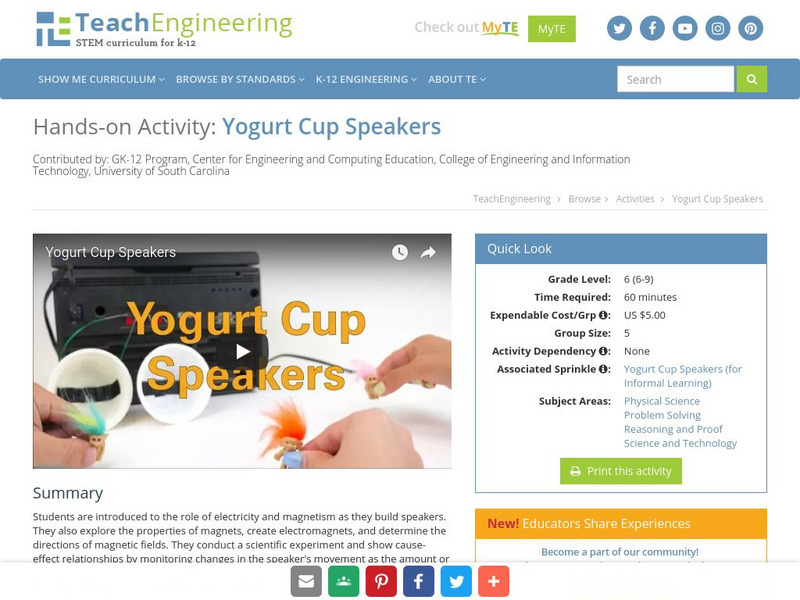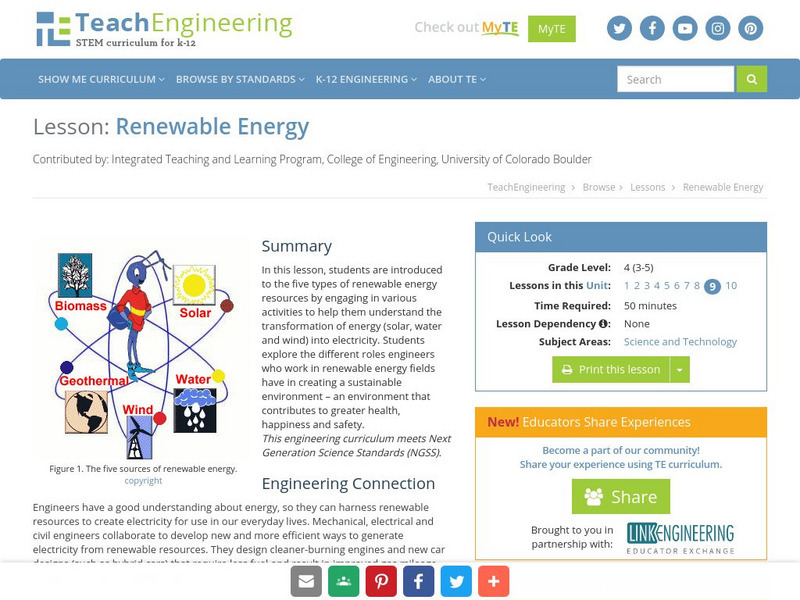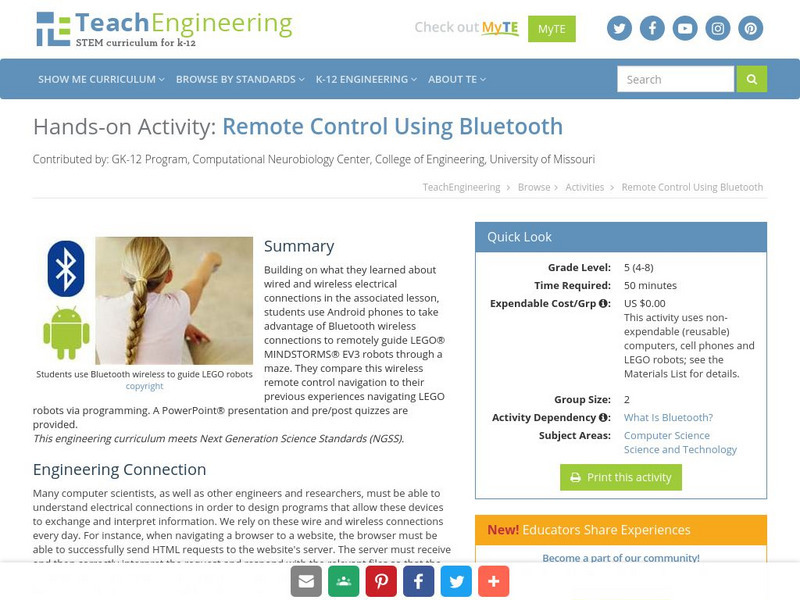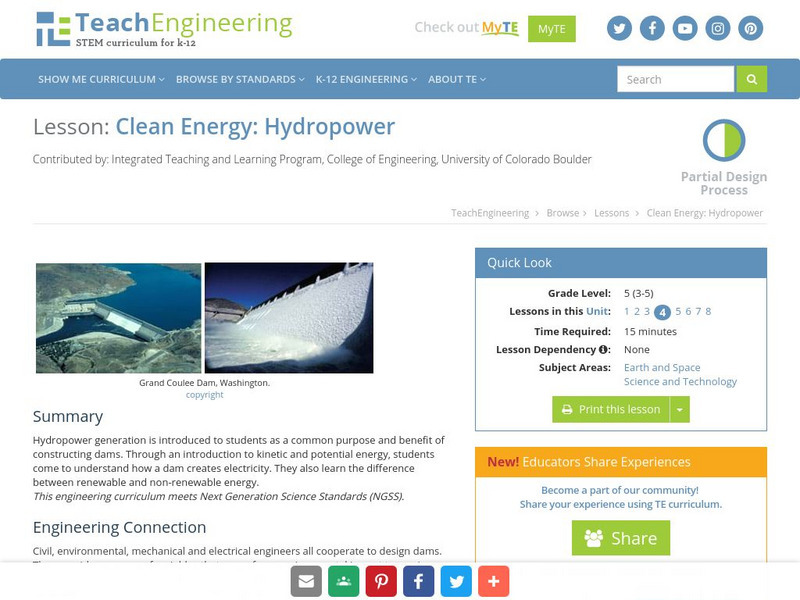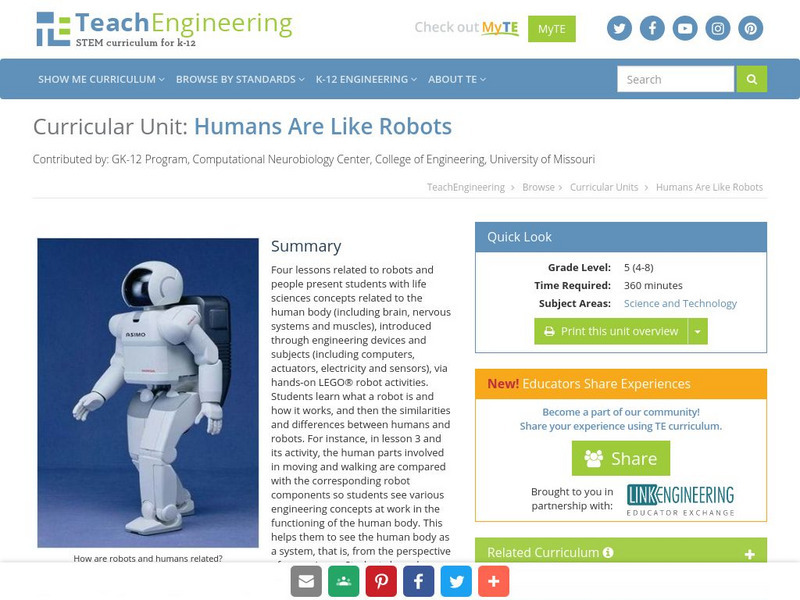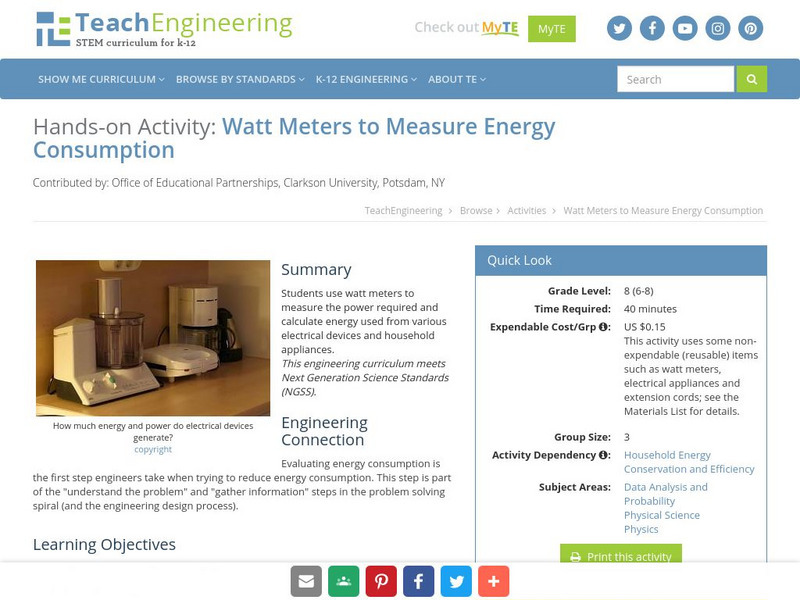Hi, what do you want to do?
TeachEngineering
Teach Engineering: Bulbs & Batteries Side by Side
We are surrounded everyday by circuits that utilize "in parallel" and "in series" circuitry. Complicated circuits designed by engineers are made of many simpler parallel and series circuits. In this hands-on activity, students build...
TeachEngineering
Teach Engineering: Switcheroo
In this hands-on activity, students construct a simple switch and determine what objects and what types of materials can be used to close a switch in a circuit and light a light bulb.
TeachEngineering
Teach Engineering: Can You Resist This?
This lab demonstrates Ohm's law as students set up simple circuits each composed of a battery, lamp and resistor. Students calculate the current flowing through the circuits they create by solving linear equations. After solving for the...
Massachusetts Institute of Technology
Mit: Open Course Ware: Engineering the Future of Solar Electricity
Part of a materials science engineering course, a project through which students investigate the future of solar electricity by creating prototypes of solar cells. Students complete exercises in "project planning, analysis, design,...
PBS
Pbs Kids:activities and Videos: Electricity
This PBS site offers videos and activities are hands-on challenges that focus on the engineering design process. They use simple materials, allow for multiple solutions, and are ideal for ages 9-12.
Texas Education Agency
Texas Gateway: Second Law of Thermodynamics: Heat Engines and Their Efficiency
By the end of this section, you will be able to state the expressions of the second law of thermodynamics; calculate the efficiency and carbon dioxide emission of a coal-fired electricity plant, using second law characteristics; and...
TryEngineering
Try Engineering: Electric Switches
Lesson focuses on how switches control the flow of electricity. Students are posed with the challenge of designing and building a simple switch into an electric circuit.
TeachEngineering
Teach Engineering: Hands on Activity: Designing a Thermostat
By building a basic thermostat, students will explore basic circuitry and electricity. The thermostat built out of a breadboard, temperature sensor chip, amplifier, and battery creates a linear relationship between temperature of the...
TeachEngineering
Teach Engineering: Take Charge!
Young scholars come to understand static electricity by learning about the nature of electric charge, and different methods for charging objects. In a hands-on activity, students induce an electrical charge on various objects, and...
TeachEngineering
Teach Engineering: Two Sides of One Force
Young scholars learn more about magnetism, and how magnetism and electricity are related in electromagnets. They learn the fundamentals about how simple electric motors and electromagnets work. Students also learn about hybrid...
TeachEngineering
Teach Engineering: A River Ran Through It
Young scholars learn how water is used to generate electricity. They investigate water's potential-to-kinetic energy transformation in hands-on activities about falling water and waterwheels. During the activities, they take...
Learn Engineering
Learn Engineering: Understanding Rotating Magnetic Field & Synchronous Speed
Get information about rotating magnetic fields and how electric machines use them for their operation. Discusses synchronous speed and number of poles on an electrical machine. The accompanying article discusses the topics found in the...
TeachEngineering
Teach Engineering: Get Your Motor Running
Students investigate motors and electromagnets as they construct their own simple electric motors using batteries, magnets, paper clips and wire.
TeachEngineering
Teach Engineering: Let the Sun Shine!
Students learn how the sun can be used for energy. They learn about passive solar heating, lighting and cooking, and active solar engineering technologies (such as photovoltaic arrays and concentrating mirrors) that generate electricity....
TeachEngineering
Teach Engineering: Yogurt Cup Speakers
This lesson introduces students to the role of electricity and magnetism as they build a speaker. In addition, students explore properties of magnets, create an electromagnet, and determine the direction of a magnetic filed. They conduct...
TeachEngineering
Teach Engineering: Renewable Energy
In this instructional activity, students are introduced to the types of renewable energy resources. They are involved in activities to help them understand the transformation of energy (solar, water and wind) into electricity. Students...
Learn Engineering
Learn Engineering: How Does an Induction Motor Work?
An article and video about the most commonly used electrical machine called an induction motor. Learn about the parts of the motors that allow the motor to function. [4:43]
TeachEngineering
Teach Engineering: Thar She Blows!
Learners learn about wind as a source of renewable energy and explore the advantages and disadvantages wind turbines and wind farms. They also learn about the effectiveness of wind turbines in varying weather conditions and how engineers...
TeachEngineering
Teach Engineering: Saltwater Circuit
Students build a saltwater circuit, which is an electrical circuit that uses saltwater as part of the circuit. Students investigate the conductivity of saltwater, and develop an understanding of how the amount of salt in a solution...
TeachEngineering
Teach Engineering: Should I Drink That?
Students perform the first steps that environmental engineers do to determine water quality - sampling and analysis. Student teams measure the electrical conductivity of four water samples using teacher-made LED conductivity testers and...
TeachEngineering
Teach Engineering: Remote Control Using Bluetooth
Building on what they learned about wired and wireless electrical connections in the associated lesson, students use Android phones to take advantage of Bluetooth wireless connections to remotely guide LEGO MINDSTORMS NXT robots through...
TeachEngineering
Teach Engineering: Clean Energy: Hydropower
Hydropower generation is introduced to students as a common purpose and benefit of constructing dams. Through an introduction to kinetic and potential energy, students come to understand how a dam creates electricity. They also learn the...
TeachEngineering
Teach Engineering: Humans Are Like Robots
Four lessons related to robots and people present students with life sciences concepts related to the human body (including brain, nervous systems and muscles), introduced through engineering devices and subjects (including computers,...
TeachEngineering
Teach Engineering: Watt Meters to Measure Energy Consumption
Students use watt meters to measure the power required and calculate energy used from various electrical devices and household appliances.






